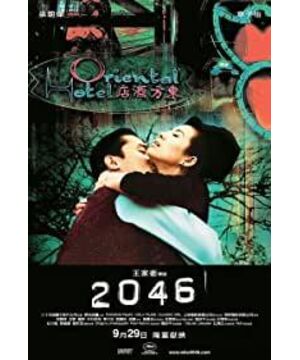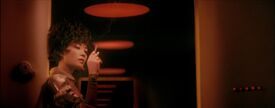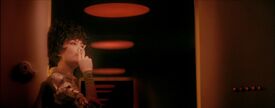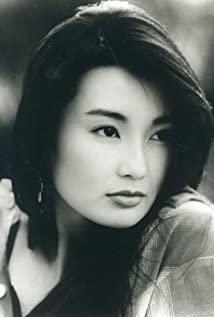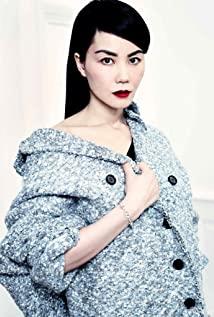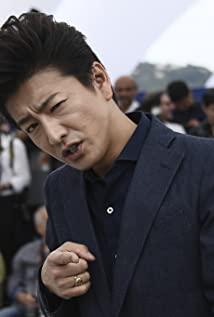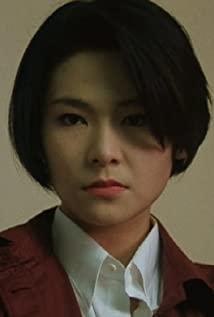Wong Kar Wai's fans are declining day by day. Of course, this has nothing to do with taste and popularity, it is a pure film issue. Some friends who were once obsessed with Wong Kar-wai movies said Wong Kar-wai had changed after watching "In the Mood for Love" (2000) and "2046" (2004). Some people even bluntly say that he is depraved, and his movies no longer have the power to make us throb. And what I want to say is: 2000 was a watershed created by Wong Kar-wai. Compared with the six films before 2000, Wong Kar-wai in "In the Mood for Love" (2000) and "2046" (2004) is the real one. Wong Kar Wai, Wong Kar Wai without adulteration. Time kept flowing forward, while Wong Kar-wai went upstream and found the original self in the image. There is a narration in "In the Mood for Love": Those passing years seem to be seen through a piece of dusty glass, but cannot be grasped. He has been thinking of everything in the past; if he can break through the dusty glass, he will go back to the long gone years. Time can't look back, but Wong Kar-wai can. Years of accumulation in art and box office finally made him break through the bottleneck between business and personal style, and he can finally shoot a film that truly expresses his inner feelings. Since Wong Kar-wai entered the arena with "Carmen in Mong Kok" (1988), he has always been known for his unruly video style and unbridled editing. His film is like a genius hand-painted graffiti, with random dots and dyes, without a word, everything Merry completely broke the usual style of Hong Kong movies. But is Wong Kar-wai really as rebellious and unscrupulous as he appeared in the movie? The answer is undoubtedly no. Out of the consideration of the box office, he usually uses a large number of big-name stars in the movie. Of course, this is understandable. What really shows us that he is worried about the box office is the coat he puts on the movie. When Wong Kar-wai entered the Hong Kong film circle in 1988, at a time when Jianghu gangster movies were flourishing, out of various considerations, Wong Kar-wai put on his debut film as a gangster film. Jianghu's spirited brotherhood is this type of film. Unchanging theme. Of course, within the coat, the clues of Wong Kar-wai's style have already appeared. Under the protagonist's fateful tragic fate and uncontrollable sad love, the film is filled with boredom and helplessness towards the rivers and lakes. It should be said that "Carmen in Mong Kok" was definitely an alternative in Hong Kong movies at the time. The film focused on the inner psychological changes of the characters and highlighted the sensibility of the characters' lines and dialogues. The lens language and art design are no longer a means, but have become narratives. Elements. It's just that Wong Kar-wai was still cautious during this period. While the garb of the Jianghu piece was eye-catching, it also restrained his hands and feet. In 1991, "The Story of A Fei" was Wong Kar-wai's truly proud work. The film defeated Li Ang and Yang Dechang at the 36th Asia Pacific Film Festival that year and won 4 titles including best director. This movie also established Wong Kar Wai's status as a master in one fell swoop. Although it gathered almost all the superstars in Hong Kong, it was terrible at the box office. Wong Kar-wai’s feelings in the 1960s have been revealed in this film, and this is almost the most complete film by Wong Kar-wai, but it is also not difficult to see that there are still commercial gimmicks such as the prodigal son A Fei and Jianghu Vendetta in the film. In "Chongqing Forest" in 1994, there is still a female killer role played by Brigitte Lin in the first story, while the second story is much smoother and peaceful, closer to Wong Kar-wai's ideal creative state. In the same year, "Evil East and West Poison", dressed in a martial arts film, told about the ambiguity and entanglement of modern people in emotions. It is worth mentioning that the Hong Kong film industry around 1994 was the time when martial arts films were popular, and the keen Wong Kar-wai did not miss this commercial gimmick-although the film still failed miserably at the box office. "Fallen Angels" filmed in 1995 can be regarded as a companion episode of "Chongqing Forest". Wong Kar-wai himself took a quiet moment and asked Takeshi Kaneshiro to subvert the classic dialogue he said in "Chongqing Forest" one by one. The film still has the coat of a commercial film, and the killer played by Liming is obviously imitating the scene in "The True Colors of Heroes" in the scene where the pony blood washes the maple pavilion. The scene where the killer agent played by Li Jiaxin lies on a bed of dawn and masturbates, which is the most gimmicky scene of the film. "Happy Together" in 1997 is very close to Wong Kar-wai’s idiosyncrasy, but Wong Kar-wai still can’t do everything he can The jaw-dropping sex scene between Leslie Cheung and Tony Leung at the beginning was pure grandstanding in my opinion. Because I always feel that even if Leslie Cheung's role is changed to a woman, it will not have much impact on the story. Time entered 2000. After waiting for 3 years, many fans of Wong Kar-wai finally came forward with his new work "In the Mood for Love". For viewers who have long been accustomed to the Wang style, this is an unsatisfactory work. For Wong Kar-wai himself, this is not only a work that fully expresses himself, but also an obvious watershed in his creation. . In "In the Mood for Love", Wong Kar-wai converges his former sharpness in photography. The lens is as stable as the story, and a large number of panning shots have replaced the once-absent perspective. Wong Kar-wai also continued his 60s complex in the movie. The story of Su Lizhen and Zhou Muyun's tolerance for repression has continued his usual refusal and escape, but anyone with a discerning eye can see that the current Wong Kar-wai is no longer the former Wong Kar-wai. After nearly 5 years of stop-and-go, we finally waited for Wang Jiawei's "2046" in the autumn of 2004. In the Hong Kong film industry, where a movie can be made in half a month, it is very rare to grind a sword in five years. Many people have even joked that we may really have to wait until 2046 to see this movie. The result of the five-year wait is that we ushered in another aspect of "In the Mood for Love". Not only does the protagonist of the film have the same name, but the feelings they yearn for in the 1960s are the same, and the temperament of the two films is also somewhat similar. Many people, including me, don’t like Wong Kar-wai after 2000, but we can’t deny that Wong Kar-wai after 2000 is the real Wong Kar-wai. His two films in this period are those who have removed the commercial gimmick coat. The expression of my true self, missing the flying knight, missing the iron-blooded and tender killer, missing the bizarre night, only the hurried men and women murmured in the emotional entanglement. I joked with my friend: Perhaps it was not something else that prompted Wang Kar-wai's complete rebellion to the end, but a self-deprecating psychology-any business gimmicks would fail the same at the box office anyway, it would be better to tell the story completely according to your own ideas. The ending of the story is: Wang Jiawei broke through the dusty glass and walked back to the long gone years in the 1960s. When time goes to the right and Wang Jiawei goes to the left, where should we who watch movies go? In "In the Mood for Love", Wong Kar-wai converges his former sharpness in photography. The lens is as stable as the story, and a large number of panning shots have replaced the once-absent perspective. Wong Kar-wai also continued his 60s complex in the movie. The story of Su Lizhen and Zhou Muyun's tolerance for repression has continued his usual refusal and escape, but anyone with a discerning eye can see that the current Wong Kar-wai is no longer the former Wong Kar-wai. After nearly 5 years of stop-and-go, we finally waited for Wang Jiawei's "2046" in the autumn of 2004. In the Hong Kong film industry, where a movie can be made in half a month, it is very rare to grind a sword in five years. Many people have even joked that we may really have to wait until 2046 to see this movie. The result of the five-year wait is that we ushered in another aspect of "In the Mood for Love". Not only does the protagonist of the film have the same name, but the feelings they yearn for in the 1960s are the same, and the temperament of the two films is also somewhat similar. Many people, including me, don’t like Wong Kar-wai after 2000, but we can’t deny that Wong Kar-wai after 2000 is the real Wong Kar-wai. His two films in this period are those who have removed the commercial gimmick coat. The expression of my true self, missing the flying knight, missing the iron-blooded and tender killer, missing the bizarre night, only the hurried men and women murmured in the emotional entanglement. I joked with my friend: Perhaps it was not something else that prompted Wang Kar-wai's complete rebellion to the end, but a self-deprecating psychology-any business gimmicks would fail the same at the box office anyway, it would be better to tell the story completely according to your own ideas. The ending of the story is: Wang Jiawei broke through the dusty glass and walked back to the long gone years in the 1960s. When time goes to the right and Wang Jiawei goes to the left, where should we who watch movies go? In "In the Mood for Love", Wong Kar-wai converges his former sharpness in photography. The lens is as stable as the story, and a large number of panning shots have replaced the once-absent perspective. Wong Kar-wai also continued his 60s complex in the movie. The story of Su Lizhen and Zhou Muyun's tolerance for repression has continued his usual refusal and escape, but anyone with a discerning eye can see that the current Wong Kar-wai is no longer the former Wong Kar-wai. After nearly 5 years of stop-and-go, we finally waited for Wang Jiawei's "2046" in the autumn of 2004. In the Hong Kong film industry, where a movie can be made in half a month, it is very rare to grind a sword in five years. Many people have even joked that we may really have to wait until 2046 to see this movie. The result of the five-year wait is that we ushered in another aspect of "In the Mood for Love". Not only does the protagonist of the film have the same name, but the feelings they yearn for in the 1960s are the same, and the temperament of the two films is also somewhat similar. Many people, including me, don’t like Wong Kar-wai after 2000, but we can’t deny that Wong Kar-wai after 2000 is the real Wong Kar-wai. His two films in this period are those who have removed the commercial gimmick coat. The expression of my true self, missing the flying knight, missing the iron-blooded and tender killer, missing the bizarre night, only the hurried men and women murmured in the emotional entanglement. I joked with my friend: Perhaps it was not something else that prompted Wang Kar-wai's complete rebellion to the end, but a self-deprecating psychology-any business gimmicks would fail the same at the box office anyway, it would be better to tell the story completely according to your own ideas. The ending of the story is: Wang Jiawei broke through the dusty glass and walked back to the long gone years in the 1960s. When time goes to the right and Wang Jiawei goes to the left, where should we who watch movies go? Many people, including me, don’t like Wong Kar-wai after 2000, but we can’t deny that Wong Kar-wai after 2000 is the real Wong Kar-wai. His two films in this period are those who have removed the commercial gimmick coat. The expression of my true self, missing the flying knight, missing the iron-blooded and tender killer, missing the bizarre night, only the hurried men and women murmured in the emotional entanglement. I joked with my friend: Perhaps it was not something else that prompted Wang Kar-wai's complete rebellion to the end, but a self-deprecating psychology-any business gimmicks would fail the same at the box office anyway, it would be better to tell the story completely according to your own ideas. The ending of the story is: Wang Jiawei broke through the dusty glass and walked back to the long gone years in the 1960s. When time goes to the right and Wang Jiawei goes to the left, where should we who watch movies go? Many people, including me, don’t like Wong Kar-wai after 2000, but we can’t deny that Wong Kar-wai after 2000 is the real Wong Kar-wai. His two films in this period are those who have removed the commercial gimmick coat. The expression of my true self, missing the flying knight, missing the iron-blooded and tender killer, missing the bizarre night, only the hurried men and women murmured in the emotional entanglement. I joked with my friend: Perhaps it was not something else that prompted Wang Kar-wai's complete rebellion to the end, but a self-deprecating psychology-any business gimmicks would fail the same at the box office anyway, it would be better to tell the story completely according to your own ideas. The ending of the story is: Wang Jiawei broke through the dusty glass and walked back to the long gone years in the 1960s. When time goes to the right and Wang Jiawei goes to the left, where should we who watch movies go?
View more about 2046 reviews


